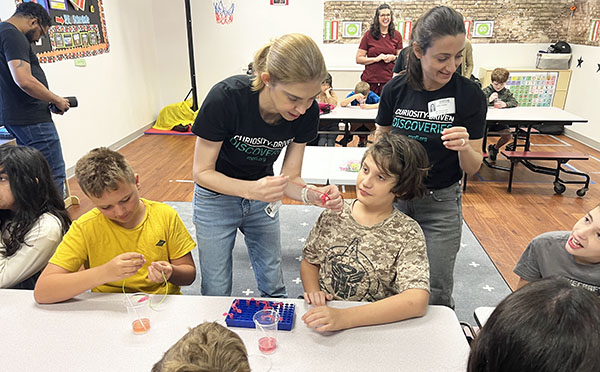The Max Planck Institute for Neuroscience is one of the most prestigious scientific organizations in the world, home to about two dozen Nobel Prize winners. Their Jupiter campus operates a public education outreach program named Ask Max. Last week, the Ask Max outreach team visited The Learning Center in Royal Palm Beach and conducted an interactive lab in which students were able to extract DNA from strawberries.
The Learning Center (TLC) is a charter school dedicated to providing specialized education and support for children with autism. The Royal Palm Beach school has earned a respected reputation teaching students with autism. The school currently has about 150 students with a long waiting list.
The Learning Center was created to fill a need for high-quality educational programming based on the procedures of applied behavior analysis, sensory processing intervention and social skills training for young children with autism spectrum disorders in Palm Beach County. The 30,000-square-foot school is located in the Royal Plaza at the corner of Southern and Royal Palm Beach boulevards.
Executive Director Stacie Routt has focused her career on providing the leadership and vision necessary to design, develop, implement and evaluate comprehensive programs of instructional and supportive services for children with autism.
“Kids on the spectrum can have the high intelligence necessary to develop an interest and understanding of things like chemistry and DNA,” Routt said. “We are delighted that the Ask Max team is coming out here and doing high-end science. Imagine learning about DNA, then actually extracting it from strawberries — a wonderful hands-on learning experience.”
Dr. Ilaria Drago is head of outreach and advancement for the Max Planck Florida Institute, where she heads up the Ask Max program. Her enthusiasm is contagious, and the kids responded well and followed instructions.
“This wasn’t our first visit to The Learning Center, and we’ve done other programs with children with autism and special needs,” Drago said. “One of the wonderful things about the Ask Max program is its flexibility — our lesson plans can be adapted to different grade levels and classroom needs. What remains universal in every visit is the excitement we see from the students. That’s truly the most rewarding part of our work.”
In short, the students placed the strawberries in a plastic bag, carefully beat them to a pulp, then by carefully following a procedure involving laundry detergent and isopropyl alcohol, the students were able to extract a pink gooey glob of strawberry DNA. In a fun and unexpected twist, the students then could insert the DNA into little plastic necklaces the Ask Max team furnished.
“The highlight of the day was when a student who initially didn’t seem very engaged suddenly lit up with joy when he saw his experiment work,” Drago said. “Those ‘wow’ moments are what stick with kids and remind them that science is fun — and that you don’t have to look like a stereotypical scientist to be one!”
The students were a mix of second and fifth graders closely supervised by school staff and the Ask Max team.
One fifth grader seemed engaged by each step of the experiment. He said his favorite part was, “When we got to smack the strawberries against the desk to mush them up.”
One second grader seemed particularly interested in the project despite being non-verbal. She successfully completed each of the steps and gave the impression of being delighted every step of the way while using her pink tablet to communicate her excitement.
Drago shared how some people are intimidated or even a little scared of science and scientists. She said that the Ask Max program has three main goals: demonstrate that science is fun; instill confidence that “I can experiment, and I can perform science,” and that science is cool; and give kids the experience of meeting scientists and hanging out with them.
She explained how they want kids leaving laboratory experiences saying things to themselves like, “I just saw a scientist, and they are just like me.”
For more information on The Learning Center, visit www.thelearningcenter.org. Learn more about the Max Planck Florida Institute for Neuroscience at www.mpfi.org.








